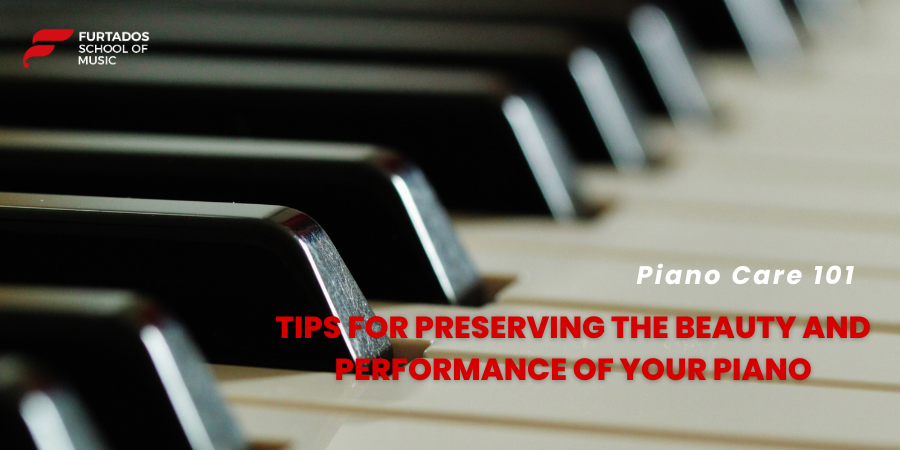As a proud pianist attending Furtados School of Music, you understand the significance of your piano as a cherished musical treasure. The piano is not just an instrument; it’s a timeless symbol of elegance and artistic expression. To ensure your piano continues to produce harmonious melodies and remains in its prime condition, proper piano care is essential. In this guide, we will share invaluable tips to help you preserve the beauty and performance of your beloved instrument.
- Clean with Care
Regular cleaning is fundamental to piano care. Use a soft, microfiber cloth to gently wipe down the keys regularly, removing dust and fingerprints. Avoid using harsh chemicals or excess moisture that may damage the piano’s finish. For a deeper clean inside the piano, enlist the assistance of a qualified piano technician. They possess the expertise to disassemble the piano safely, remove accumulated dust, and clean the delicate internal components without causing any harm to your beloved instrument.
- Monitor Humidity Levels
The piano is particularly sensitive to changes in humidity. Extreme variations in humidity levels can lead to issues such as tuning instability, cracks in the soundboard, and warping of the wood. Invest in a hygrometer to monitor the humidity level around your piano. Aim for a relative humidity level between 40% to 50%. This range will help prevent potential damage caused by fluctuations.
- Schedule Regular Piano Tuning
Tuning is an integral part of piano care. As a dedicated pianist, you may notice that the piano’s pitch gradually shifts due to factors like humidity, temperature changes, and normal wear of the strings. Schedule regular piano tunings with a qualified piano tuner. This ensures that your piano stays in tune and produces harmonious melodies. Generally, pianos should be tuned at least twice a year, but more frequent tunings may be recommended based on usage and environmental conditions.
- Protect from Environmental Factors
Shield your piano from direct sunlight and keep it away from sources of heat or cold, such as radiators and air conditioning vents. These factors can cause damage to the piano’s finish and affect its overall performance. Ensure that your piano is placed on a level surface to prevent structural issues over time. Avoid placing heavy objects on the piano’s surface, as this can lead to permanent damage.
- Mind Your Playing Technique
Playing the piano with excessive force can strain the keys and internal mechanisms. Practice proper playing technique to avoid unnecessary wear and tear. Additionally, encourage proper hand positioning and posture, which can prevent strain and enhance your playing comfort.
- Avoid Food and Liquids Near the Piano
Eating or drinking near the piano can lead to spills and accidents. Liquids can seep into the keys and cause irreversible damage to the sensitive internal components. To keep your piano in top shape, establish a rule of no food or drinks near the instrument.
- Seek Professional Maintenance
For more complex piano care and maintenance tasks, don’t hesitate to seek assistance from a qualified piano technician. They can conduct thorough inspections, address any issues, and provide expert advice on preserving your piano’s beauty and performance.
By following these essential piano care tips, you can ensure your beloved instrument remains a cherished musical treasure for years to come. At Furtados School of Music, we are passionate about nurturing your musical journey, offering exceptional Piano Classes, including Online Piano Classes, and providing the guidance and support you need to excel as a pianist. Embrace the joy of creating beautiful melodies and expressing your emotions through the enchanting sound of your piano keys. Enroll in our Piano Classes near you and embark on a melodious journey of self-expression and creativity.
